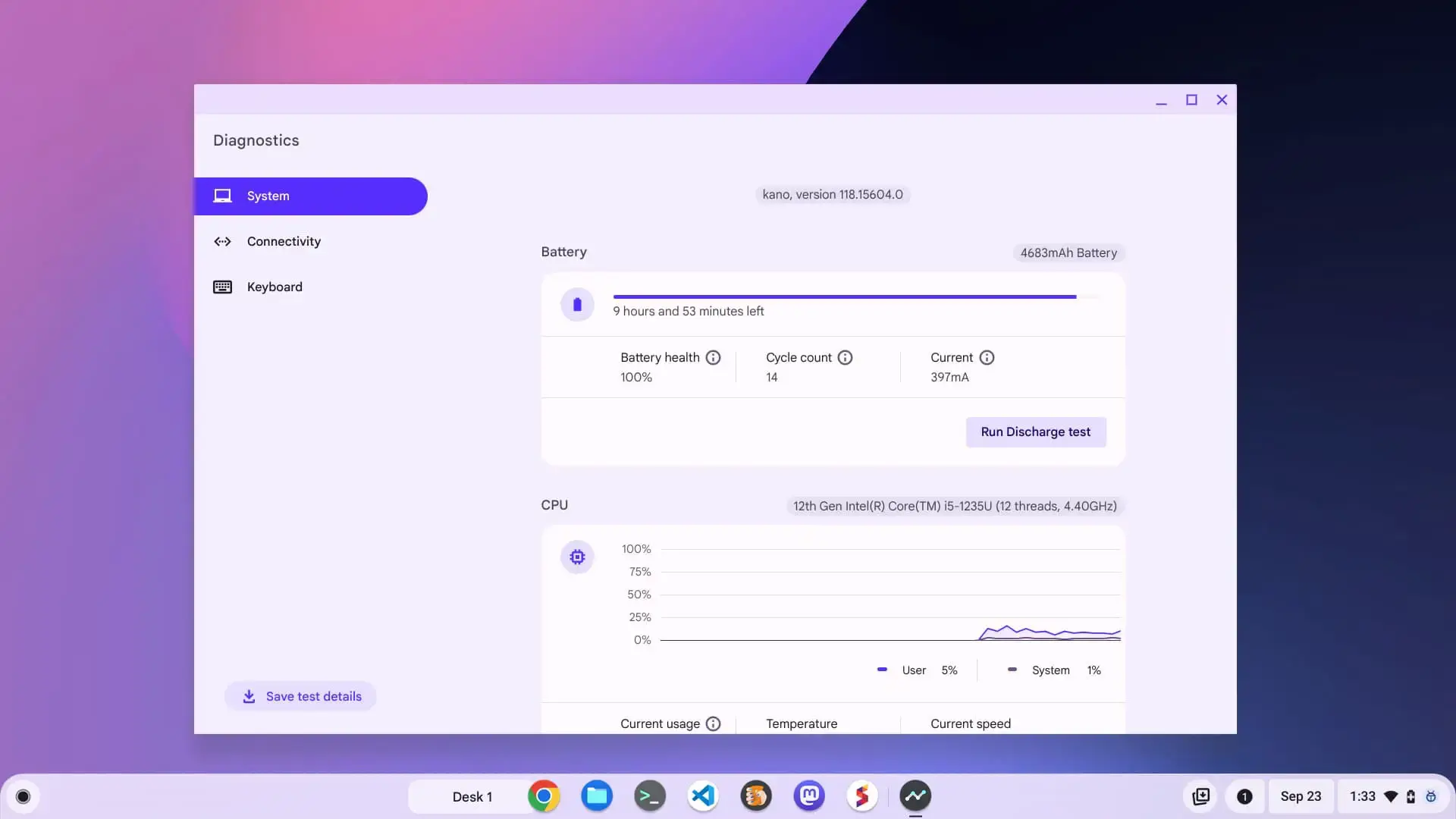literally, all Chrome OS / chromium OS needs to do for me to actually embrace it. is native out of box flatpack support
one issue I might see them having with flatpack, is the permissions right now are handled kind of stupidly IMO. but if those get solved I think flatpack would be a great addition to chromium os ecosystem
And not spy me across the OS, which it probably will.
there are forks of chromium OS like thoriumOS, I could see an “Ungoogled chromiumOS” being a viable path to go down
IMO you’re just better off using Debian with their DE directly, then. ChromeOS doesn’t provide anything extra, just a different DE.
chromeOS provides a LOT. its very easy to use and quite reliable, and its super easy computer illiterate people to get into.
I have tried most distros, pretty much every single one that claims to be user friendly. not a single one holds a candle to chrome/chromiumOS.
for a lot of people chromeOS is genuinely a good experience that Linux simply cannot replicate. the polish is very much beyond what other distros provide.
When I tried it, it seemed like mostly just Debian with another DE, but maybe I/you haven’t tried it recently enough…
Also,
for a lot of people chromeOS is genuinely a good experience that Linux simply cannot replicate.
It’s literally Linux.
traditional linux distros, sorry thought the implication was obvious.
but the user experience really is different, its been great since my family and old customer base love it and need a lot less help with it
Flatpak is still in the packager teething stage - it’s going to be a couple/few years before all of the packaging and permission kinks are worked out. There’s already progress, I’m spending a lot less time unfucking flatpak permissions with flatseal than I was in 2019.
While this would definitely be useful and make linux software more accessible, I’m worried about something similar to Android’s Google Play Services eventually happening where almost every piece of software, despite being for an open source operating system, depends on proprietary google software
Im not too worried myself, it’s worth noting that I myself am perfectly fine using a fully foss android phone with the sole exception of discord, since even the webclient for that sucks. it is possible they could eventually go down that path, but as long as the option is there for foss I don’t really mind too much
As long as you have a Crostini-capable ChromeOS device, you can run flatpacks. This is actually the preferred way to run Firefox (via the Linux Flatpack).
crostini is still in a vm (albiet crosvm is really good) I would really prefer real native
The virtual machine adds valuable security isolation with hardly any performance penalty. What’s the drawback?
there is a noticeable perf penalty on devices I’ve tested, particularly around gpu (but that may change in the future) it’s also just kinda a bit annoying for normal folk to use i’ve found
Some Chromebooks are pretty hackable. I’ve got an older one that I reflashed with tianocore UEFI firmware. It makes for a pretty decent cheap and lightweight low power laptop. You can run basically any standard ARM Linux distro on it.
Maybe I’m mistaken on this, but I’m fairly certain the screenshot they describe as “Unity” is just a heavily themed GNOME. Also, I’ve never seen Xfce stylized as “XFCe.” I realize that’s not the point of the article, but just something that stood out to me.
That is actually Unity. It’s a mildly modified version used in Ubuntu Unity. Also, Xfce was also misspelled as XCFe.
Unity is GNOME, but it’s the official name of Ubuntu’s customized GNOME.
No it’s not, Unity is a separate project that Ubuntu retired, but fans have kept it alive.
It’s “technically” both. Ubuntu called their themeing Unity because that’s the desktop it’s supposed to emulate the style of.
deleted by creator
This article is a bit strange
Even though you can install Linux desktop applications for that container, you can’t use it to modify the Linux code (huh?) that runs ChromeOS
Unless he’s on Gentoo (he’s not, he is on PopOS) to modify and recompile his kernel every time, I don’t see what he’s trying to say here.
The title feels accurate, but misleading, like yeah it is Linux, with another desktop environment, but when they say this
While most Linux distributions come with a default desktop environment, users can install and choose from many others. You can’t do that on ChromeOS, which is why I say ChromeOS uses Google’s desktop environment. Choice would be nice here but I really do like the new Material You interface.
I’m like, no shit ChromeOS uses Google’s desktop environment? And what changed from the past versions that it is so “now more than ever”? On the contrary, from what I’m reading, there was even an effort in the Chromium OS development to decouple the browser from the window manager to make them standalone components (it seems to have succeeded in fact: mus+ash), now I’m not sure if it’s actually possible to Frankenstein a “real” desktop environment to replace or exist alongside Aura shell, but the point still doesn’t make much sense.
When I use ChromeOS, I am limited. By Google
Meh, you’re limited by the product’s features, if GNOME allowed as little customization (wink wink) you’d say the same, now that’s not to say that Google doesn’t force its vision on the user and that Chromium isn’t an open source project that is more or less closed in on itself, but it could always adopt some features inspired from other projects, some will never be there of course, namely extensions or “applets”.
The bit about modifying the Linux code is to say you can’t run a a built-from-source version of the kernel or DE, like you could do with Fedora or Ubuntu or Arch or distro.
The bit about “now more than ever” is because by separating the browser and OS (Lacros) it’s no longer the browser-based OS we’ve always known it to be. Now it’s Google Linux with Chrome browser (Linux And Chrome OS).
you can’t run a a built-from-source version of the kernel or DE
That’s sad, do you know why that is? Is it that you can’t use a generic Linux kernel as a drop-in replacement or that you couldn’t even modify the source of the kernel used by ChromiumOS?
And with “Google Linux”, do you mean its architecture is fundamentally different from the average distribution to be compatible with software that would otherwise run on it?
Well, you can build and run from source using Chromium. But that doesn’t have all the features of ChromeOS, just like AOSP vs what you get on a Pixel phone.
I can’t imagine that Google have changed the kernel architecture. I just meant to differentiate that it’s their own distribution rather than another Debian derivative or something.
Ah, you’re right, the fact that Chrome has stuff not on Chromium is a pretty big deal, a few years ago I tried to use a project that attempted to somehow bridge the gap, I think it was Brunch and it was a pain to get working.
it’s their own distribution rather than another Debian derivative or something.
I understand
deleted by creator
Interesting, didn’t know about the container thing!
ChromeOS is Linux is technically correct I would say in the least helpful way possible. Linux but it misses the point.
The site is aboutchromebooks.com, hmm…
It always was.
Quite possibly one of the most misleading statements ive ever read.
Does this mean I can reasonably expect to buy a Chromebook and install vanilla Linux without huge headaches?
There’s always been Linux distros that targeted Mac hardware. There’s got to be something like that for chromebooks, right?
Not even remotely. It requires custom firmware which often requires physical disassembly to install. From there you can install any distro, but you will continue to have many small issues and inconveniences often due to the nonstandard keyboard.
There was a Chromebook targeted Linux distro called eupnea that could be installed without custom firmware via depthboot, but it’s dead now and the original repo got deleted after the Dev got hacked, so the build scripts don’t work anymore.
Why would you not be able to? Isn’t a chromebook just a laptop with garbage specs?
Not really. A Chromebook to a laptop is basically what a gaming console is to a desktop pc. Yes, it shares a lot of hardware, and the ISA too these days, but even then a lot of it might be trimmed down without any notice, or on the software side, you might be locked into what you get. They did make it easier to install Linux flavors, bit you still get what you get
the true wysiwyg device
There are actually Chromebooks with very solid specs, but no, it isn’t that simple. They have custom firmware and components that often don’t play well with Linux, or Windows for that matter.
Okay, thanks for clearing this up. Chromebooks have turned me off since their inception, I just assumed since they are made by regular laptop companies that they are plain old low-spec machines running a lightweight OS with minimal functionality.
deleted by creator
Not always, I have one with an amd chipset that I can’t get Linux on (last time I checked).
You have to open them up and remove a screw then install different firmware.
The dell Chromebook 11 I got from eBay for under £20 was easy to get it working on though.
You can install vanilla Linux, but huge headaches are involved.
I did it, and it worked, but I had to open is and remove a foil (equivalent to a jumper), go to developer mode, then flash a new bootloader by running a script from GitHub.
Think flashing a ROM on a pretty locked down Android device.
The upside is that when the process is done, you have a regular PC and no need to do any cumbersome process again.
Chromebooks use some custom tailored coreboot variant, right? Not surprising that they’ve locked it down while they were at it.
No, this isn’t something you can expect.
There used to be a distro called Gallium OS, but it’s been dead for a couple years now.
deleted by creator
They have the best security of any desktop OS iirc
You’re not safe from Google though. And that’s quite a big backdoor if you’re a target of interest.
deleted by creator
Security, not privacy
ChromeOS has sandboxing, which already puts it miles ahead of Windows and Linux (no, the Flatpak Sandbox doesn’t count)
deleted by creator
windows sandbox is… getting there, macos is decent but iirc the app dev can choose to not use it. all Linux options require user intervention to ensure it’s set up properly. ChromeOS’ sandboxing technique is inherited from Android and is the strongest/strictest of any desktop operating system.
In my desktop at home the main OS is Ubuntu, basically since more than 15 years, but I own also 2 Chromebooks laptops. I have a Lenovo Duet which i use mainly because I can run both Android and Linux apps, and it allow me to watch streaming services in offline. I would prefer to use any “gnu-linux” distro on a portable device, but if you wish to watch Amazon Prime or Netflix offline, you can only use a tablet with Android or iOs but on linux pc you are limited on web app typically, except in Chromebook which has some extra flexibility. Also I don’t find invasive so far, more or less we have the same privacy settings as in Android. As benefit it’s supported for 10 years for OS updates. And, in the future I may also decide to install a pure linux distro if I need.
Its called torrenting my friend. Real control, real offline, no proprietary DRM bullshit
I have used years ago different download platforms, years before Torrent, in the time of Napster, Emule etc. but so far the official streaming service provide a good offer, without wasting time. I don’t think it worst the effort to download illegally ie comparing with price of Prime. I see now a tendency when the platform cost will increase and users should, in theory have 10 platforms, where i may understand the reason for people returning to illegal download. The streaming service companies should think carefully before increasing the price or creating new rules to share the cost.
Sure, they provide a good offer but force you to use a Chromebook instead of a regular Linux distro… Sounds like a big constraint to me.
I understand. In this case we should blame the streaming companies about it and if I need this function I have not much choice apart illegal download.
Stremio can stream torrents do free with a netflix-like interface.
Thanks. It’s interesting but I’m traveling a lot for business, and I need offline content. That’s one of reasons to use Chromebook for me .
I often find movies I dont get anywhere. Music even more, awesome quality.
I would definitely get a Chromebook, but only once you can change the default browser from Chrome without needing to do any weird workarounds like Android apps
As someone who has owned a Chromebook for several years, I can tell you that you shouldn’t. Hardware wise it’s hard to beat Chromebooks at their price points, but the complete lack of control over the system is a deal breaker. I don’t have time to list all of the issues I’ve had. In many cases what would have been trivial fixes on a normal Linux system required full reinstalls on chromeOS. Like the time I accidentally filled up the fairly modest system storage. The system refused to allow me to delete anything, requiring a reset just to get local file management abilities back.
I ultimately ended up installing full Linux on it, which ended up being a whole other ordeal due to all of Google’s “security” features.
Do you have to jailbreak the hardware to install another OS or is it supported?
There are 2 ways to do it, either via depthboot(software only, no custom firmware, lots of manual OS prep, 0 risk) or custom firmware(maybe physical, model dependant, no os prep, small risk). For custom firmware you usually have to either bridge an internal jumper, unplug the battery, or build a custom cable, depending on your model.
While it is allowed it’s not supported by google.
I would never recommend buying a Chromebook with the intention of replacing the OS unless you’re looking for a project or you’re getting it for cheap.
TLDR it’s harder to replace the OS on a Chromebook than a Mac, and you get none of the benefits of Mac hardware.
It kinda crazy you can’t do this, wasn’t Microsoft forced to let you change default browsers in an antitrust suit?
Its okay, once Microsoft introduces EdgeOS, they can claim that Edge is an integral part of the OS, and therefore cannot be removed.
…oh wait, that’s just Windows 10 onwards
Hilarious title. Can you install Firefox?
Can you uninstall Chrome?
But that would turn them into books.
Mission accomplished.
You can install from Android or from linux environment, but last one is a virtualization and it’s a bit slow.
Check chromebrew too https://github.com/chromebrew/chromebrew/tree/master/packages
And yet an onscreen keyboard for linux apps is still “on the roadmap”…
With wayland this also happens in the rest of linux.
I mean, that’s the case for KDE too, so can’t really throw stones there.
Okay, aboutchromebooks.com
I don’t understand the point of this article. It said all that it had to say with the headline alone. Everything else is filler.
“ChromeOS is Linux in disguise. But people already knew this.” Ok. And?
Welcome to journalism in 2023. You don’t write anything out of passion anymore, you’re just filling your weekly quota with random words
How much did you pay for journalism last month? And yet you expect quality and passion.
I don’t expect quality from them, that’s why I don’t really pay attention to corporate journalism. I get most of this kind of information from individual creators, and I do support those when I can
Good for you, and I’m impressed by your undefensive and unhuffy reply.
Because the amount of entitlement I see about professional journalism really pisses me off, personally. There is a reason that much (not all) journalism is not the quality it used to be. It’s because nobody is frigging paying for it any more. Journalists are not the perpetrators in this story, they are the victims. The internet has caused their profession to implode. It’s their jobs that have disappeared on a huge scale, their salaries that have shrunk, their career choice that turned out to be a catastrophic bad move. All because of a technical innovation, basically. Well, personally I think we may come to regret the demise of this profession which served society well for at least a century. But the least we can do is stop the victim-blaming.
Rant over. No, I am not a journalist. Very glad of that career choice.


















